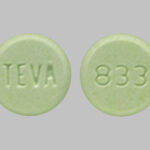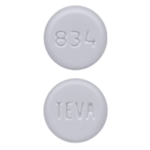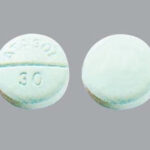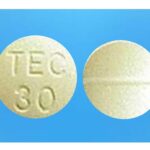Teva Lenoltec 3: Uses, Dosage, Side Effects, Addiction

Teva Lenoltec 3 is a combination medication containing acetaminophen, caffeine, and codeine. Acetaminophen is a less potent pain reliever. Caffeine is a stimulant that relaxes blood vessels to improve blood flow. Codeine is an opioid pain medication (sometimes called a narcotic).
Teva Lenoltec 3 is used to help relieve mild to moderate pain (such as headaches, muscle pain). It contains an opioid pain reliever (codeine), a non-opioid pain reliever (acetaminophen), and caffeine. Codeine works in the brain to change how your body feels and responds to pain. Acetaminophen can also reduce a fever. Caffeine increases pain relief, especially for certain types of headaches. It may also be used for purposes not listed in this medication guide.
Warning
Codeine has a risk for abuse and addiction, which can lead to overdose and death. Codeine may also cause severe, possibly fatal, breathing problems. To lower your risk, your doctor should have you take the smallest dose of codeine that works, and take it for the shortest possible time. See also How to Use section for more information about addiction.
The risk for severe breathing problems is higher when you start this medication and after a dose increase, or if you take the wrong dose/strength. Taking this medication with alcohol or other drugs that can cause drowsiness or breathing problems may cause very serious side effects, including death. Also, other medications can affect the removal of codeine from your body, which may affect how codeine works. Be sure you know how to take this medication and what other drugs you should avoid taking with it. See also Drug Interactions section. Get medical help right away if any of these very serious side effects occur: slow/shallow breathing, unusual lightheadedness, severe drowsiness/dizziness, difficulty waking up.
Keep this medicine in a safe place to prevent theft, misuse, or abuse. If someone accidentally swallows this drug, get medical help right away.
One ingredient in this product is acetaminophen. Taking too much acetaminophen may cause serious (possibly fatal) liver disease. Adults should not take more than 4000 milligrams (4 grams) of acetaminophen a day. People with liver problems and children should take less acetaminophen. Ask your doctor or pharmacist how much acetaminophen is safe to take.
Do not use with any other drug containing acetaminophen without asking your doctor or pharmacist first. Acetaminophen is in many nonprescription and prescription medications (such as pain/fever drugs or cough-and-cold products). Check the labels on all your medicines to see if they contain acetaminophen, and ask your pharmacist if you are unsure.
Get medical help right away if you take too much acetaminophen (overdose), even if you feel well. Overdose symptoms may include nausea, vomiting, loss of appetite, sweating, stomach/abdominal pain, extreme tiredness, yellowing eyes/skin, and dark urine.
Daily alcohol use, especially when combined with acetaminophen, may damage your liver. Avoid alcohol.
Before using Teva Lenoltec 3, women of childbearing age should talk with their doctor(s) about the risks and benefits. Tell your doctor if you are pregnant or if you plan to become pregnant. During pregnancy, this medication should be used only when clearly needed. It may slightly increase the risk of birth defects if used during the first two months of pregnancy. Also, using it for a long time or in high doses near the expected delivery date may harm the unborn baby. To lessen the risk, take the smallest effective dose for the shortest possible time. Babies born to mothers who use this drug for a long time may develop severe (possibly fatal) withdrawal symptoms. Tell the doctor right away if you notice any symptoms in your newborn baby such as crying that doesn’t stop, slow/shallow breathing, irritability, shaking, vomiting, diarrhea, poor feeding, or difficulty gaining weight.
Children younger than 12 years should not use products that contain codeine. Children between 12 and 18 years old should not use codeine after certain surgeries (including tonsil/adenoid removal). Also, codeine use is not recommended for children between 12 and 18 years old who are obese or have breathing problems. Some children are more sensitive to codeine and have had very serious (rarely fatal) breathing problems such as slow/shallow breathing (see also Side Effects section). Talk with your doctor or pharmacist about the risks and benefits of this medication.
How to use Teva Lenoltec 3
Take Teva Lenoltec 3 by mouth as directed by your doctor, usually every 4 to 6 hours as needed for pain. You may take this drug with or without food. If you have nausea, it may help to take this drug with food. Ask your doctor or pharmacist about other ways to decrease nausea (such as lying down for 1 to 2 hours with as little head movement as possible).
The dosage of Teva Lenoltec 3 is based on your medical condition and response to treatment. Do not increase your dose or use this drug more often or for longer than prescribed because your risk of side effects may increase. Properly stop the medication when so directed.
Pain medications work best if they are used as the first signs of pain occur. If you wait until the pain has worsened, the medication may not work as well.
Suddenly stopping Teva Lenoltec 3 may cause withdrawal, especially if you have used it for a long time or in high doses. To prevent withdrawal, your doctor may lower your dose slowly. Tell your doctor or pharmacist right away if you have any withdrawal symptoms such as restlessness, mental/mood changes (including anxiety, trouble sleeping, thoughts of suicide), watering eyes, runny nose, nausea, diarrhea, sweating, muscle aches, or sudden changes in behavior.
When this medication is used for a long time, it may not work as well. Talk with your doctor if this medication stops working well.
Though it helps many people, this medication may sometimes cause addiction. This risk may be higher if you have a substance use disorder (such as overuse of or addiction to drugs/alcohol). Take this medication exactly as prescribed to lower the risk of addiction. Ask your doctor or pharmacist for more details.
Tell your doctor if your pain does not get better or if it gets worse, if redness/swelling occurs in the area of pain, if you have new symptoms such as a high fever, or if you have a headache that doesn’t go away.
Side Effects of Teva Lenoltec 3
Nausea, vomiting, constipation, lightheadedness, dizziness, drowsiness, headache, increased urination, or trouble sleeping may occur. If any of these effects persist or worsen, tell your doctor or pharmacist promptly.
To prevent constipation, eat dietary fiber, drink enough water, and exercise. You may also need to take a laxative. Ask your pharmacist which type of laxative is right for you.
To reduce the risk of dizziness and lightheadedness, get up slowly when rising from a sitting or lying position.
Remember that your doctor has prescribed this medication because he or she has judged that the benefit to you is greater than the risk of side effects. Many people using this medication do not have serious side effects.
Tell your doctor right away if you have any serious side effects, including:
- interrupted breathing during sleep (sleep apnea)
- mental/mood changes (such as irritability, nervousness, anxiety, hallucinations)
- fast/irregular heartbeat
- stomach/abdominal pain
- difficulty urinating
- vision changes
- shaking (tremor)
- easy bruising/bleeding
- signs of infection (such as sore throat that doesn’t go away, fever)
- signs of your adrenal glands not working well (such as loss of appetite, unusual tiredness, weight loss)
Get medical help right away if you have any very serious side effects, including:
- fainting
- seizure
Codeine is changed into a strong opioid drug (morphine) in your body. In some people, this change happens faster and more completely than usual, which increases the risk of very serious side effects. Get medical help right away if you notice any of the following:
- slow/shallow breathing
- severe drowsiness/difficulty waking up
- confusion
A very serious allergic reaction to this drug is rare. However, get medical help right away if you notice any symptoms of a serious allergic reaction, including:
- rash
- itching/swelling (especially of the face/tongue/throat)
- severe dizziness
- trouble breathing.
This is not a complete list of possible side effects. If you notice other effects not listed above, contact your doctor or pharmacist.
In the US -Call your doctor for medical advice about side effects. You may report side effects to FDA at 1-800-FDA-1088 or at www.fda.gov/medwatch.
In Canada – Call your doctor for medical advice about side effects. You may report side effects to Health Canada at 1-866-234-2345.
Precautions
Before taking Teva Lenoltec 3, tell your doctor or pharmacist if you are allergic to codeine, acetaminophen, or caffeine; or to other opioid pain medications (such as morphine); or if you have any other allergies. Teva Lenoltec 3 may contain inactive ingredients, which can cause allergic reactions or other problems. Talk to your pharmacist for more details.
Before using Teva Lenoltec 3, tell your doctor or pharmacist your medical history, especially of:
- brain disorders (such as head injury, tumor, seizures)
- breathing problems (such as asthma, sleep apnea, chronic obstructive pulmonary disease-COPD)
- gallbladder disease
- heart problems (such as irregular heartbeat, recent heart attack)
- kidney disease
- liver disease
- mental/mood disorders (such as confusion, depression, thoughts of suicide)
- personal or family history of a substance use disorder (such as overuse of or addiction to drugs/alcohol)
- obesity
- stomach/intestinal problems (such as blockage, constipation, diarrhea due to infection, paralytic ileus)
- disease of the pancreas (pancreatitis)
- difficulty urinating (such as due to enlarged prostate).
This drug may make you dizzy or drowsy. Alcohol or marijuana (cannabis) can make you more dizzy or drowsy. Do not drive, use machinery, or do anything that needs alertness until you can do it safely. Avoid alcoholic beverages. Talk to your doctor if you are using marijuana (cannabis).
Before having surgery or certain medical procedures (such as a heart stress test or a procedure to restore a normal heart rhythm if you have an unusually fast heartbeat), tell your doctor or dentist that you use this medication and about all the products you use (including prescription drugs, nonprescription drugs, and herbal products).
Some children may be more sensitive to very serious side effects of the codeine in this product, such as extreme sleepiness, confusion, or slow/shallow/noisy breathing. (See also Warning section.)
Older adults may be more sensitive to the side effects of this drug, especially confusion, dizziness, drowsiness, trouble sleeping, and slow/shallow breathing.
During pregnancy, Teva Lenoltec 3 should be used only when clearly needed. It may harm an unborn baby. Discuss the risks and benefits with your doctor.
Teva Lenoltec 3 passes into breast milk and may have undesirable effects on a nursing infant, such as unusual sleepiness, difficulty feeding, trouble breathing, or unusual limpness. Breast-feeding while using this drug is not recommended. Consult your doctor before breastfeeding.
Drug Interactions
Drug interactions may change how your medications work or increase your risk for serious side effects. This document does not contain all possible drug interactions. Keep a list of all the products you use (including prescription/nonprescription drugs and herbal products) and share it with your doctor and pharmacist. Do not start, stop, or change the dosage of any medicines without your doctor’s approval.
Some products that may interact with Teva Lenoltec 3 include:
- certain pain medications (mixed opioid agonist-antagonists such as pentazocine, nalbuphine, butorphanol)
- naltrexone
The risk of serious side effects (such as slow/shallow breathing, severe drowsiness/dizziness) may be increased if this medication is taken with other products that may also cause drowsiness or breathing problems. Tell your doctor or pharmacist if you are taking other products such as other opioid pain or cough relievers (such as morphine, hydrocodone), alcohol, marijuana (cannabis), drugs for sleep or anxiety (such as alprazolam, lorazepam, zolpidem), muscle relaxants (such as carisoprodol, cyclobenzaprine), or antihistamines (such as cetirizine, diphenhydramine).
Check the labels on all your medicines (such as allergy or cough-and-cold products, pain relievers) because they may also contain acetaminophen, caffeine, or ingredients that cause drowsiness. Ask your pharmacist about using those products safely.
Other medications can affect the removal of this product from your body, which may affect how this product works. Examples include azole antifungals (such as ketoconazole), bupropion, fluoxetine, macrolide antibiotics (such as erythromycin), HIV medications (such as ritonavir), paroxetine, quinidine, rifamycins (such as rifabutin, rifampin), certain drugs used to treat seizures (such as carbamazepine, phenytoin), among others.
Avoid drinking large amounts of beverages containing caffeine (coffee, tea, colas) and eating large amounts of chocolate.
This medication may interfere with certain medical/laboratory tests (including certain urine tests, amylase/lipase levels, dipyridamole-thallium imaging tests), possibly causing false test results. Make sure laboratory personnel and all your doctors know you use this drug.
Overdose
If someone has overdosed and has serious symptoms such as passing out or trouble breathing, give them naloxone if available, then call 911. If the person is awake and has no symptoms, call a poison control center right away. US residents can call their local poison control center at 1-800-222-1222. Canada residents can call a provincial poison control center. Symptoms of overdose may include slow/shallow breathing, coma, seizures, nausea, vomiting, loss of appetite, sweating, stomach/abdominal pain, extreme tiredness, yellowing eyes/skin, dark urine.
Notes
Do not share this medication with others. Sharing it is against the law.
This medication has been prescribed for your current condition only. Do not use it later for another condition unless your doctor directs you to do so. A different medication may be necessary in that case.
Ask your doctor or pharmacist if you should have naloxone available to treat opioid overdose. Teach your family or household members about the signs of an opioid overdose and how to treat it.
You may also find useful information on Atasol-30





